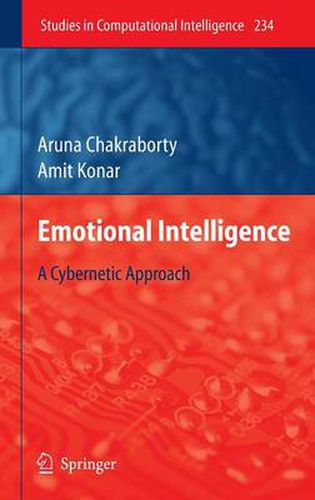Readings Newsletter
Become a Readings Member to make your shopping experience even easier.
Sign in or sign up for free!
You’re not far away from qualifying for FREE standard shipping within Australia
You’ve qualified for FREE standard shipping within Australia
The cart is loading…






This title is printed to order. This book may have been self-published. If so, we cannot guarantee the quality of the content. In the main most books will have gone through the editing process however some may not. We therefore suggest that you be aware of this before ordering this book. If in doubt check either the author or publisher’s details as we are unable to accept any returns unless they are faulty. Please contact us if you have any questions.
Emotional Intelligence is a new discipline of knowledge, dealing with modeling, recognition and control of human emotions. The book Emotional Intelligence: A Cybernetic Approach, to the best of the authors’ knowledge is a first compreh- sive text of its kind that provides a clear introduction to the subject in a precise and insightful writing style. It begins with a philosophical introduction to E- tional Intelligence, and gradually explores the mathematical models for emotional dynamics to study the artificial control of emotion using music and videos, and also to determine the interactions between emotion and logic from the points of view of reasoning. The later part of the book covers the chaotic behavior of - existing emotions under certain conditions of emotional dynamics. Finally, the book attempts to cluster emotions using electroencephalogram signals, and d- onstrates the scope of application of emotional intelligence in several engineering systems, such as human-machine interfaces, psychotherapy, user assistance s- tems, and many others. The book includes ten chapters. Chapter 1 provides an introduction to the s- ject from a philosophical and psychological standpoint. It outlines the fundamental causes of emotion arousal, and typical characteristics of the phenomenon of an emotive experience. The relation between emotion and rationality of thoughts is also introduced here. Principles of natural regulation of emotions are discussed in brief, and the biological basis of emotion arousal using an affective neu- scientific model is introduced next.
$9.00 standard shipping within Australia
FREE standard shipping within Australia for orders over $100.00
Express & International shipping calculated at checkout
This title is printed to order. This book may have been self-published. If so, we cannot guarantee the quality of the content. In the main most books will have gone through the editing process however some may not. We therefore suggest that you be aware of this before ordering this book. If in doubt check either the author or publisher’s details as we are unable to accept any returns unless they are faulty. Please contact us if you have any questions.
Emotional Intelligence is a new discipline of knowledge, dealing with modeling, recognition and control of human emotions. The book Emotional Intelligence: A Cybernetic Approach, to the best of the authors’ knowledge is a first compreh- sive text of its kind that provides a clear introduction to the subject in a precise and insightful writing style. It begins with a philosophical introduction to E- tional Intelligence, and gradually explores the mathematical models for emotional dynamics to study the artificial control of emotion using music and videos, and also to determine the interactions between emotion and logic from the points of view of reasoning. The later part of the book covers the chaotic behavior of - existing emotions under certain conditions of emotional dynamics. Finally, the book attempts to cluster emotions using electroencephalogram signals, and d- onstrates the scope of application of emotional intelligence in several engineering systems, such as human-machine interfaces, psychotherapy, user assistance s- tems, and many others. The book includes ten chapters. Chapter 1 provides an introduction to the s- ject from a philosophical and psychological standpoint. It outlines the fundamental causes of emotion arousal, and typical characteristics of the phenomenon of an emotive experience. The relation between emotion and rationality of thoughts is also introduced here. Principles of natural regulation of emotions are discussed in brief, and the biological basis of emotion arousal using an affective neu- scientific model is introduced next.